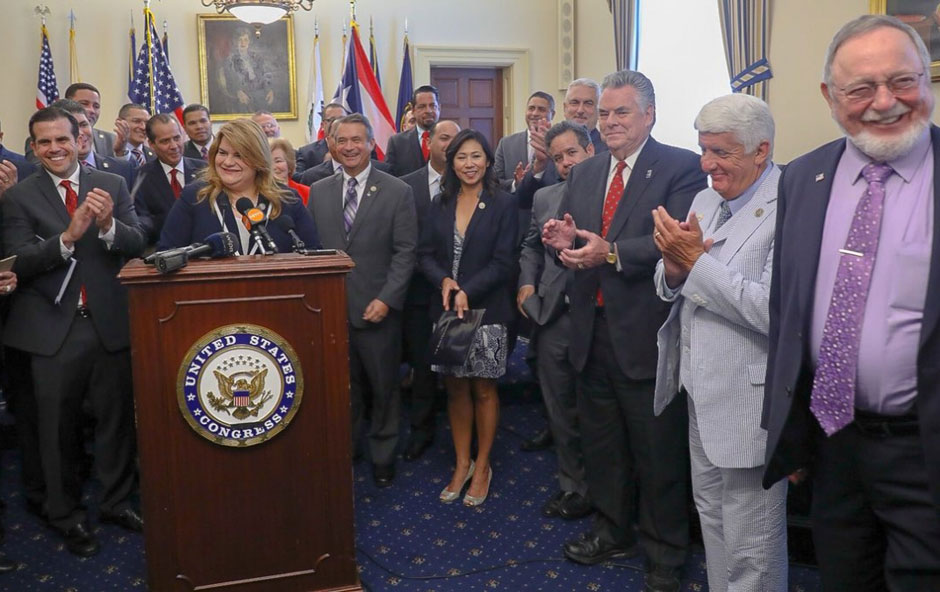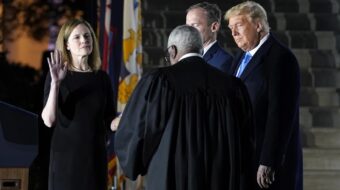
SAN JUAN, P.R.–The new Puerto Rico death toll estimate from Hurricane Maria a year ago – 2,975, virtually equal to the number killed in the 9/11 attacks in 2001 – comes as support is rising on Capitol Hill for eventually making the 3-million-person commonwealth the nation’s 51st state.
But there are a lot of conditions attached to that effort.
Meanwhile, Puerto Rico’s advocates, including Service Employees Local 32BJ, Labor Council for Latin American Advancement (LCLAA) and the American Federation of Teachers (AFT) and UnidosUS are using the numbers to demand the Trump administration really get off its ass and help the island recover from the killer storm and follow-up Hurricane Irma.
The new push for action came after an independent investigation, ordered under pressure by GOP Gov. Ricardo Rossello – who is also ostensibly pro-statehood – disclosed the new numbers.
The 2,975 dead include not just people who died in the immediate days following the devastating hurricane, but those who died later from inadequate medical care, storm-related diseases, unsanitary conditions, lack of transportation for care due to smashed roads, or after-effects of accidents and depression. And Puerto Rico’s kids must still travel to “damaged schools” over “unpaved roads” a year after Maria, said AFT President Randi Weingarten.
“This third independent study confirms yet again what we have known all along, that the federal government’s attempt to downplay the severity of Hurricane Maria and lack of urgency in helping the people of Puerto Rico was lethal,” said Melissa Mark-Viverito, campaign director for Power 4 Puerto Rico, the coalition which includes the unions, LCLAA and union-backed Make The Road New York.
“If the (Trump) administration fails to learn from and act on these lessons, they will be guilty of fatal negligence,” Mark-Viverito told an August 30 press conference on the island.
“The people of Puerto Rico are nearly a year from when Hurricane Maria tore through their homes, families, and livelihoods, and we are only starting to get some of the answers as to why the federal and Puerto Rican governments’ responses were shamefully inadequate not only in preventing this tragedy but also in assessing its scale.”
The study by physicians and investigative staffers from George Washington University in D.C. “also confirms the need for a 9/11-style investigative commission, as proposed by Rep. Nydia Velázquez, D-N.Y., to conduct a full accounting of why the federal and Puerto Rican governments were unable to save the lives of so many of our fellow citizens,” Mark-Viverito said.
One big reason for the high death toll is that Maria left the island’s already crumbling and creaky infrastructure – including its old and patched-up electrical grid – a wreck. Much of the island stayed without power for months after the storm, despite repair work from union volunteers. That killed people who depended on regular power to run their medical devices, such as a dialysis machine
And the roads were so blocked that patients needing to see doctors or get to clinics for care couldn’t do so. Inadequate infrastructure and hit-and-miss repairs “currently leaves the island’s residents vulnerable to the same nightmare they experienced almost a year ago,” the coalition added.
That gives a push to the statehood bill H.R.6246, which the island’s non-voting congressional delegate, Republican Jennifer Gonzalez-Colon, filed earlier this year. It now has 54 supporters from both parties, including the chairman of the House committee that would handle it. Gonzalez-Colon introduced more GOP and Democratic supporters of her statehood bill four days before the new numbers came out.
“Every day, we are closer to culminating the claim of the majority of Puerto Ricans who aspire to a worthy status on an equal treatment with their fellow citizens in the states,” she said in a press conference in late August.
The last island-wide plebiscite on Puerto Rico’s status produced a 92 percent majority for statehood, but on only a 23 percent turnout, as the island’s Popular Democratic Party (PPD) – informally allied with the mainland Democrats – told its pro-commonwealth supporters to boycott the voting. They did.
H.R.6246 would establish a congressional working group on “Equality for American Citizens of Puerto Rico” that will have 13 months to recommending amendments or repeal of laws that differentiate Puerto Rico from the mainland, temporary economic measures to help the Puerto Rican transition and studying the impact on Congress and the electoral college of admitting Puerto Rico to statehood.
“I’m pleased to be one of the sponsors,” said Rep. Rob Bishop, R-Utah, chairman of the House Committee on Natural Resources, which would handle the statehood bill. “I look forward to the day 51 is a reality.” He later tweeted: “I commend @RepJenniffer’s introduction of the statehood bill, it continues the important conversation about the future of Puerto Rico, and I strongly support her in this endeavor.”
Rep. Jose Serrano, D-N.Y., whose South Bronx congressional district is 63 percent Hispanic and has New York’s highest concentration of Puerto Ricans, added the legislation “is more about ending colonialism than about bringing statehood.”
Supportive Rep. Stephanie Murphy, D-Fla., explained: “The hard truth is that Puerto Rico’s lack of political power allows Washington to treat Puerto Rico like an afterthought, as the federal government’s inadequate preparation for and response to Hurricane Maria made crystal clear.”
The statehood bill is also a response to the federal government’s inadequate response to the hurricane’s devastation, congressional supporters said. Even the Federal Emergency Management Agency (FEMA), which recently announced it would terminate housing aid to Puerto Ricans, admitted its response was inadequate, SEIU 32BJ President Hector Figueroa said last month.
“The agency said that it didn’t properly prepare for the storm and didn’t provide enough supplies to Puerto Ricans,” he told the Amsterdam News.
AFT President Weingarten, a New York City (Brooklyn) middle school history and civics teacher, said the new death figures reinforce the federal government’s disastrous response to the hurricane.
“Given the findings from the tragic report released by George Washington University, it is difficult not to conclude that this administration’s response to Hurricane Maria was not just negligent, but malevolent. Hurricane Maria was a terrible natural disaster, but its death toll was worsened by the lack of a quick and adequate government response,” she said.
“We will honor the memory of those who died by demanding the federal government rebuild Puerto Rico to standards we expect as American citizens. And we will make sure the politicians who aided and abetted the administration’s negligence are held accountable in November,” she vowed.
Aida Diaz, president of AFT’s Puerto Rican affiliate, the Asociación de Maestros de Puerto Rico, added: “Every Puerto Rican knew the number of people killed by Hurricane Maria exceeded the official figure provided by the government,” which was 64, before the study.
“Nobody understands the reasons we were misled. It is outrageous that neither the magnitude of what we were suffering nor the meaning of our losses have been understood. And it is a shame that the Donald Trump government has not worked efficiently to provide a dignified response to the emergency we experienced.”
Other legislation would forgive Puerto Rico’s debts to Wall Street bond traders. And the Equitable Rebuild Act “would ensure federal funding provided to the islands is protected from Wall Street vulture funds and acted upon with local input and local workers,” said its sponsors, Sens. Bernie Sanders, Ind.-Vt., Kirsten Gillibrand, D-N.Y., Elizabeth Warren and Ed Markey, both D-Mass., and Kamala Harris, D-Calif. “The U.S. Territorial Relief Act builds from this legislation to allow all U.S. territories to address overwhelming debt loads, recover with dignity, and build strong economies,” add those senators and their House co-sponsor for both bills, Rep. Nydia Velázquez, D-N.Y..
Trump stands by his regime’s response. “I think we did a fantastic job in Puerto Rico,” he said after the new numbers came out – ignoring his prior slam that Puerto Ricans “want everything given to them.”
He drew a sharp retort from San Juan Mayor Carmen Yulin, one of the most articulate critics of the feds’ efforts – or lack of them – after Maria.
Trump is “incapable of feeling empathy,” she said. “There is nothing worse than people that don’t want to hear the truth. And the truth is this: “The Trump administration failed the people of Puerto Rico.”
Like free stuff? So do we. Here at People’s World, we believe strongly in the mission of keeping the labor and democratic movements informed so they are prepared for the struggle. But we need your help. While our content is free for readers (something we are proud of) it takes money — a lot of it — to produce and cover the stories you see in our pages. Only you, our readers and supporters, can keep us going. Only you can make sure we keep the news that matters free of paywalls and advertisements. If you enjoy reading People’s World and the stories we bring you, support our work by becoming a $5 monthly sustainer today.












Comments